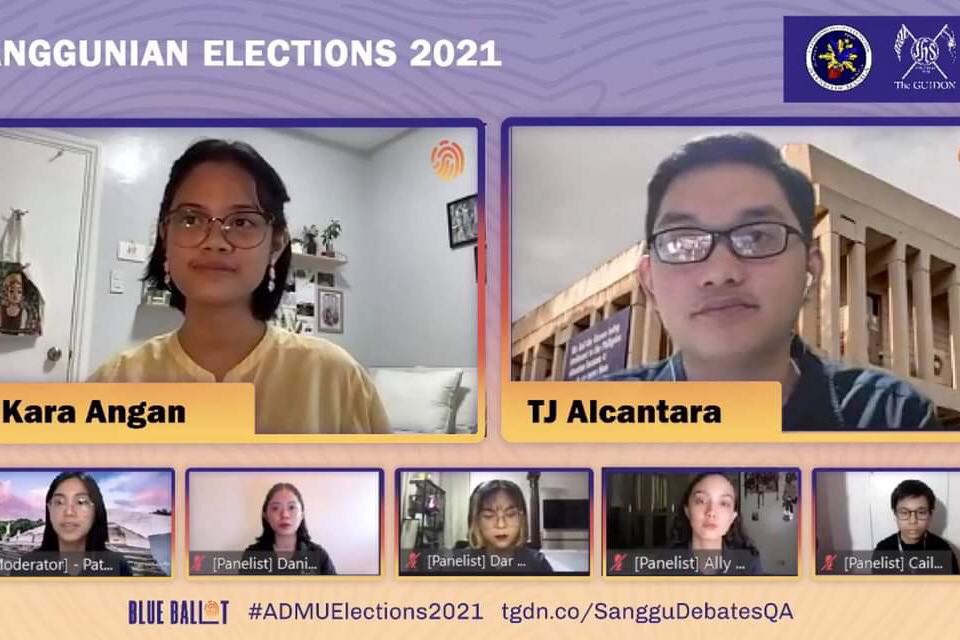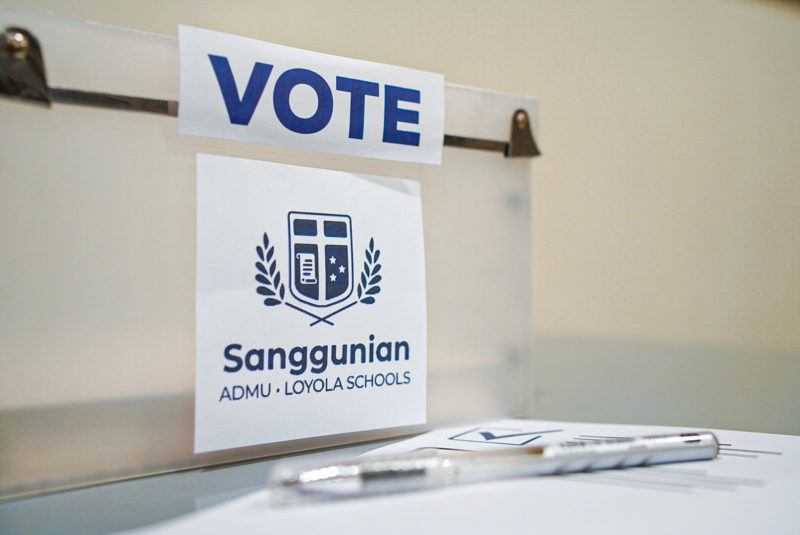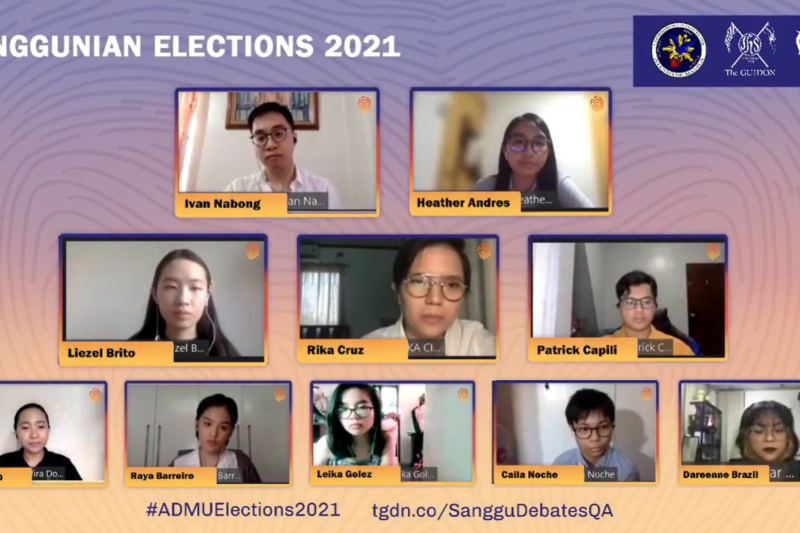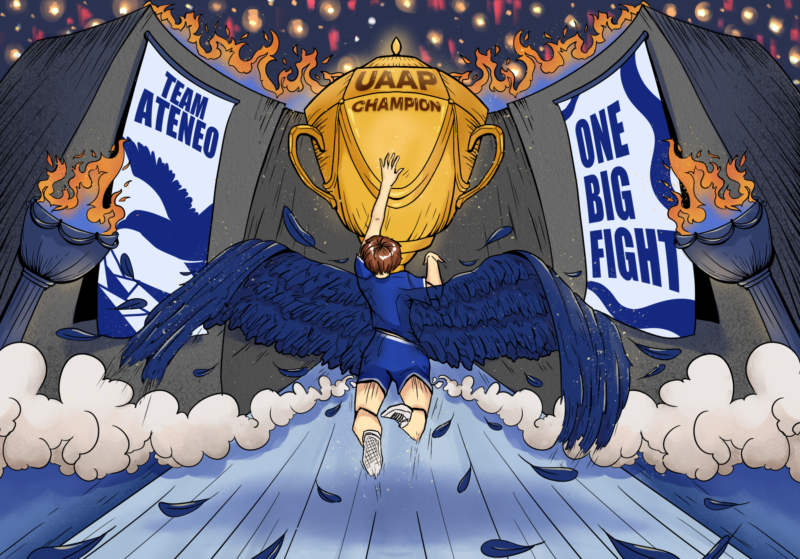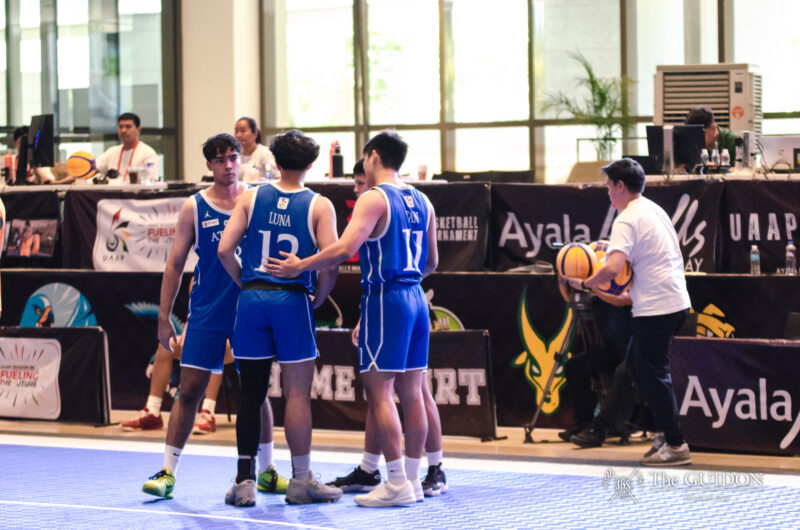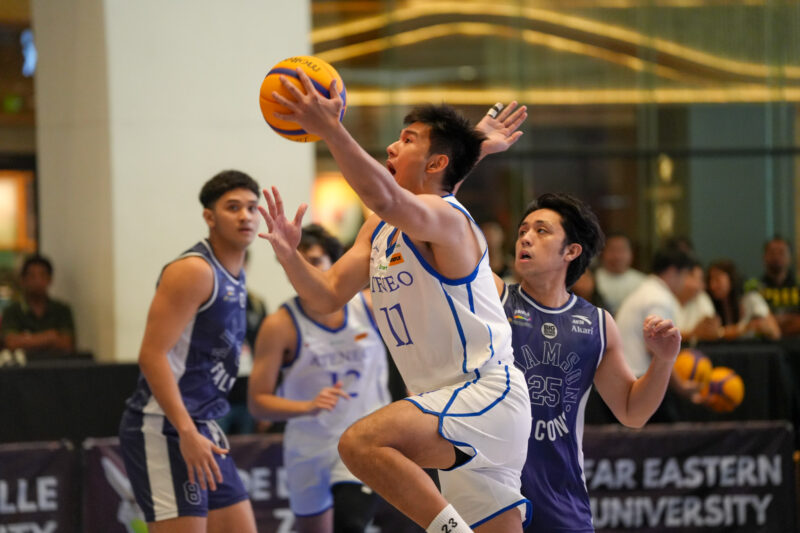CONTENT WARNING: This story contains discussion of sexual harassment.
THE UPCOMING national elections, grassroots movements, and the Sanggunian’s communication strategy were some of the topics discussed in the Sanggunian Presidential and Vice Presidential (PVP) Debates on March 27.
Independent presidential candidate Kara Angan (1 AB POS) and RISE Coalition vice presidential candidate TJ Alcantara (2 AB POS-MPM) were present in the debates.
The 2021 Sanggunian PVP debates marks the final part of the 2021 Sanggunian Debate series and the first Sanggunian General Elections since AY 2018-2019.
Sanggunian’s role in national issues
The first round of the debate tackled national issues and began with a question for Angan on how she intends to use her platform to inform the student body regarding the 2022 national elections.
Angan responded by noting that the Sanggunian can reach students to convene on national issues through town hall meetings with local officials. Along with this, she mentioned that the Council of Organizations of the Ateneo – Manila and the League of Independent Organizations may hold their own initiatives to encourage voter registration.
Panelist and The GUIDON’s Editor-in-Chief Danielle Garcia then asked whether the BluePrint for Stakeholder Engagement in Angan’s platform applies to the 2022 national elections context and how this can reach students experiencing internet connectivity issues. Angan responded that the BluePrint will provide guidelines on localizing consultations through different communication channels and added that the Sanggunian can convene a task force to maximize its reach.
This prompted Panelist and Matanglawin Ateneo’s Punong Patnugot Caila Noche to probe Angan about her concrete plans to engage sectors in voter registration. In response, Angan reiterated that the Sanggunian can form a task force of representatives from each Central Assembly sector to aid in raising awareness for the 2022 national elections. Angan also responded in a later answer that Sanggunian should utilize a “whole-of-student-body” approach. This involves getting student organizations to disseminate information and engage with their members as these groups are where students are more comfortable.
Following this, Alcantara asked Angan whether the Ateneo should officially endorse national elections candidates that share the University’s principles. In response, Angan asserted her stance that the Ateneo “has its hands tied” as an educational institution and partner of government and non-government bodies. Nonetheless, Angan posited that endorsing candidates is more feasible to discuss at the student body level. “There are a lot of resources that we can better apply and strategize for the 2022 elections,” she said.
Panelist and The GUIDON’s Sports Editor Ally Crespo posed another question to Angan on how she plans to organize her communication strategy in discussing the 2022 elections with the student body. Angan responded that the Sanggunian’s communication strategies are mostly visual-centric and proposed to extend the student government’s networks by coordinating with the Confederation of Publications, student organizations, and even faculty departments in disseminating information. Angan also brought up the use of text and email for the same purpose.
The next question was then directed to Alcantara, which tackled the Sanggunian’s role in discussions on the reinstatement of death penalty in the country. Alcantara brought up Ateneo’s role as an educational institution to raise awareness on whether death penalty can truly deter crime. Moreover, he cited that organizations such as the Ateneo Human Rights Center and Ateneo Legal Services Center can serve as partners in lobbying against death penalty. Alcantara also pointed out that the Sanggunian can consider contacting Ateneo alumni working in the government to express that the death penalty should not be reinstated.
In relation to this, Angan asked Alcantara on whether Sanggunian can actively lobby and participate in national issues.
“To tie it back in lobbying, we still need to enhance our education in terms of research,”Alcantara replied. He explained that lobbying to officials must be grounded in research and the experience of the direct stakeholders. He added that the Sanggunian has been active in lobbying on national issues such as during the petition against the Anti-Terrorism Law. For Alcantara, partnering with various other organizations, institutions, and student governments can give the Ateneo a more prominent stance.
Unresolved University concerns
Tackling University concerns, the second round of the debate opened with a question for Angan on how she plans to approach grassroots movements similar to One Big Strike (OBS) during her term. Angan responded that the Sanggunian currently has a “monopoly on knowledge” in handling issues, especially with regard to communicating with the LS administration. To address this, she said that the Sanggunian must work “hand in hand” with the grassroots movement.
“The right to assemble should not just be taken in a vacuum,” Angan said. “We need to be able to provide the support systems in place to make sure these grassroots movements are fully realizing the right to assemble.”
Alcantara then raised that while OBS created “momentum” in terms of students’ socio-political engagement, it also created divisions in the student body when the Central Assembly voted on the issue.
Given this, he asked Angan what she would have done differently if she had been president at the time. Angan disagreed with Alcantara’s sentiment that voting on the issue only caused division. While she stated that the student body looks to the Sanggunian in decisive action—hence the importance of sector representatives in the Central Assembly voting—she did not address the question.
Following this, Crespo asked how Angan intends to engage with students not currently in any sector. Angan said that there is a need to review the electoral code and strengthen course representatives since academic life is the common denominator for all students. Along with this, Angan believes that the Sanggunian must forge a stronger connection with class beadles to ensure that each student is engaged.
Overall, Angan stated that the current mode of constituency checks used to engage the student body is still evolving.
“The way forward would be to convene a multi-sectoral committee and technical working group to work on a blueprint for stakeholder engagement that will help better clarify [how we] as a community [can] make holistic decisions to [that are] representative of the constituents and the student body,” she said.
On the issue of sexual harassment, Alcantara was asked about how the Sanggunian plans to readdress past cases filed before the new Code of Decorum and Administrative Rules were implemented. While he admitted that he is not “the best person to speak on this,” Alcantara mentioned that the LS Gender Hub and the Sanggunian’s Commission on Anti-Sexual Misconduct and Violence aid survivors of sexual harassment. He did not expound further on his plans.
In line with this, Crespo followed up with Alcantara for suggestions on how the Sanggunian can protect the student body from sexual harassment. Alcantara responded by stating that the Sanggunian is attempting to reach out to anonymous authors who have posted about sexual abuse on Blue Katip Freedom Wall by offering these authors “lines of communication.”
Garcia also asked Alcantara in the open forum for his sentiments on the extent of transparency that the student body should demand from the administration regarding sexual harassment cases. Although Alcantara noted that consent of relevant parties must be heeded, he believes that progress trackers should be released regarding these cases. “If the students would not know that there is really justice happening, they wouldn’t actually feel safer inside the university,” Alcantara added.
He also raised that the Sanggunian must reassess its policies and continue to provide training for sexual harassment case handling.
After this, Angan and Alcantara were asked how they plan to make Ateneo more inclusive to sectors such as students belonging to indigenous peoples. Both candidates agreed that building sectoral representation faces large barriers. Angan suggested that the Sanggunian can form commissions similar to the Commission on Persons with Special Needs Inclusion* to reach out to sectors and craft policies relevant to them. She also suggested coordinating with relevant administration offices in identifying these students from certain sectors.
The issue of red-tagging was also discussed, as both candidates were asked how they would ensure the safety of student journalists and activists. Alcantara mentioned that the Sanggunian is currently crafting a Socio-political Safeguarding Bill that will not only provide legal and psychosocial services, but also define socio-political engagement. On the other hand, Angan emphasized improving the Commission on Socio-Political Development and ensuring that students have a direct line for help should red-tagging incidents arise.
In the open forum, Alcantara was also asked how he will mobilize the student body to participate in relief efforts. Alcantara cited that donation drives alone are unsustainable and that the Sanggunian should also focus on capacity-building and livelihood training for disaster-struck communities. “It shouldn’t be an instant or a one year project,” Alcantara said, adding that a sustainable response would have to involve multiple sectors and groups outside of Sanggunian.
Alcantara also hopes to extend capacity-building to the Ateneo Employees Workers’ Union issue and connect them to different student organizations, all while lobbying their concerns to the University administration.
Improving Sanggunian internals
The final round revolved around the Sanggunian’s internal concerns, starting with a question for Angan on whether the student government appropriately handled external emergencies, such as the COVID-19 pandemic and typhoons, while balancing internal efforts.
Angan answered that the Sanggunian and student organizations were still struggling with adjusting to the online setup at the time and claimed that it would be “unfair” to judge whether Sanggunian responded well to these external crises. She acknowledged, however, that there is room for improvement on the Sanggunian’s end.
Alcantara affirmed Angan’s response and proceeded to ask her how the student government can help with the COVID-19 response. Angan answered that the Sanggunian can work not only with relevant Ateneo offices and partner organizations, it can also cooperate with external organizations in lobbying for national policies that will help address the pandemic.
Crespo then asked Angan how she plans to evaluate Sanggunian’s communication strategy. Angan replied that data gathering in a bottoms-up approach can be utilized in order to inform Sanggunian’s communication strategy in future initiatives. In line with this, Angan believes that actions must include the Ateneo community as a whole. “[Sanggunian] can’t just be one body anymore executing [solutions], we need a whole-of-student-body approach.”
Alcantara also proposed that each of the Sanggunian’s over-200 members can hold individual consultations with one student on a weekly basis. When asked about the sustainability of this initiative, Alcantara mentioned that they can implement this so long as students see the importance of the initiative. However, he did not expound on the logistics behind this possible initiative.
“This is an initiative that doesn’t really benefit only Sanggu, but also the whole student body,” he said. Alcantara added that Sanggunian members will be trained in active listening and gender sensitivity to better hold these consultations.
Closing statements
Following the last round of the debates, the candidates were given a final opportunity to address the student body through their closing statements.
Angan began her statement by saying that she understands the concerns surrounding her experience. She acknowledged that while she has a limited view of the student body as a freshman, Angan has a “vision and a plan to get there.”
“We need a student government that allows students to participate in every step of the way,” Angan said.
During his closing statement, Alcantara invited students to help build the Sanggunian. He emphasized that the student government is hinged on cooperation with the student body.“The leaders we have empowered are the ones that will continue our fight,” Alcantara stated.
The Sanggunian General Elections will be held on April 12 to 16, 2021.
Editor’s Notes:
*The Sanggunian established the Commission of Ateneans for Indigenous Peoples during AY 2015-2016.
**Kara Angan is an Inquiry staffer for The GUIDON. This was written following editorial guidelines.

